Unit 2 Witnessing time Word power: Greek in English 课件(19张PPT)
文档属性
| 名称 | Unit 2 Witnessing time Word power: Greek in English 课件(19张PPT) |
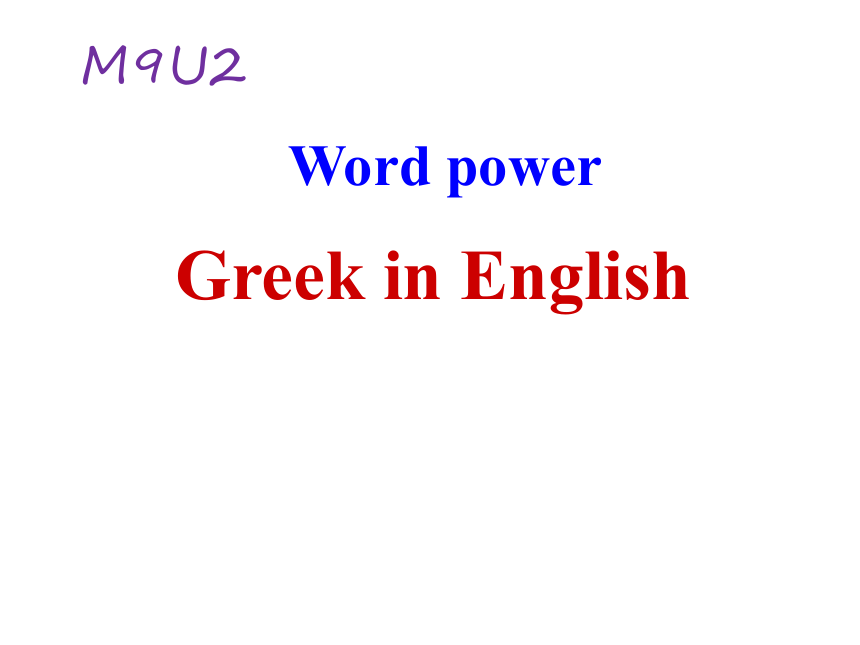
|
|
| 格式 | zip | ||
| 文件大小 | 1.7MB | ||
| 资源类型 | 教案 | ||
| 版本资源 | 牛津译林版 | ||
| 科目 | 英语 | ||
| 更新时间 | 2020-03-02 09:55:51 | ||
图片预览

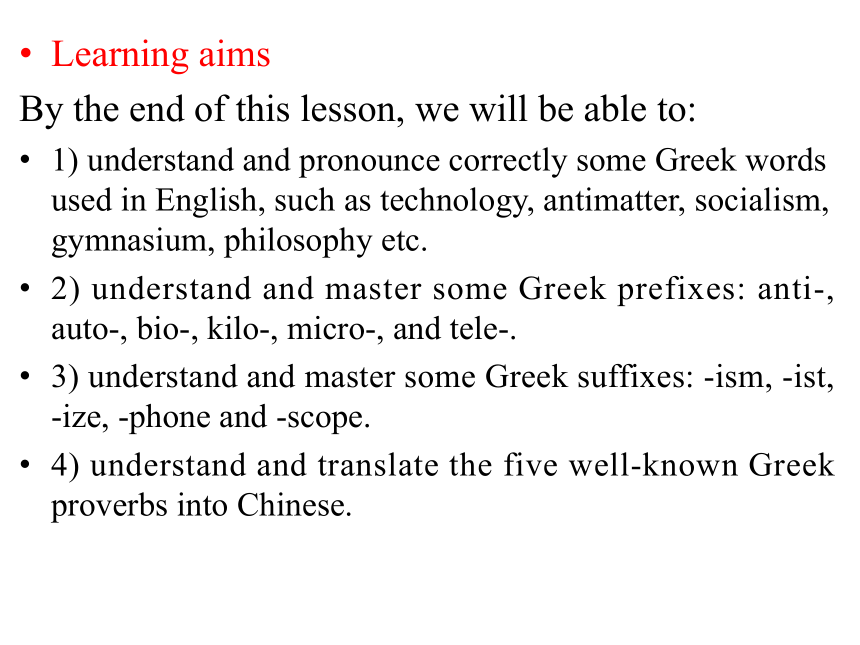
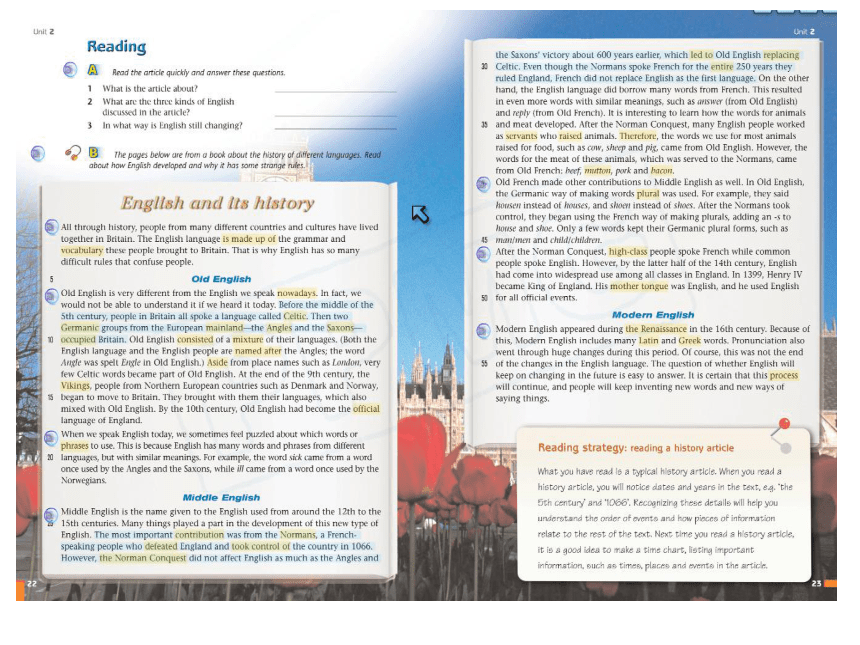

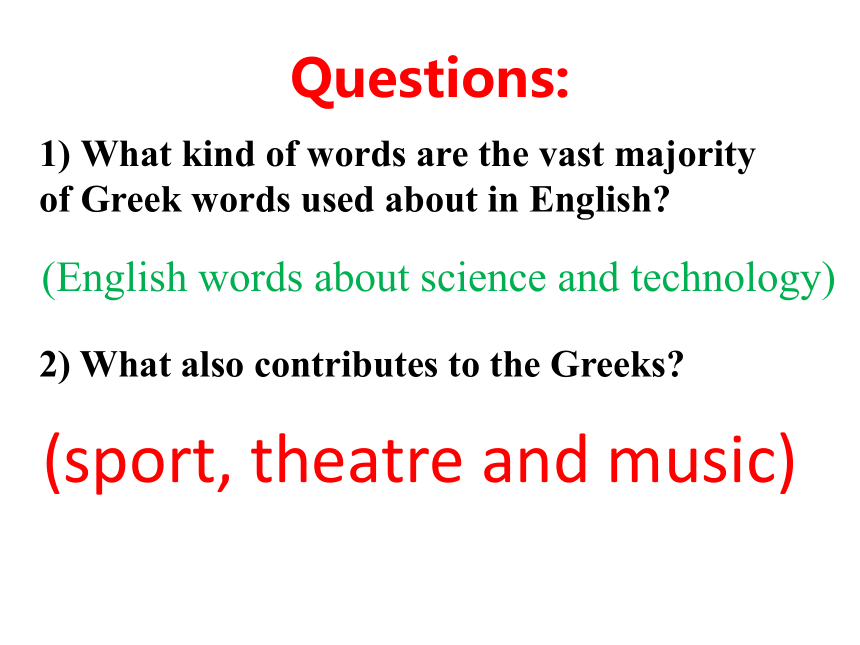

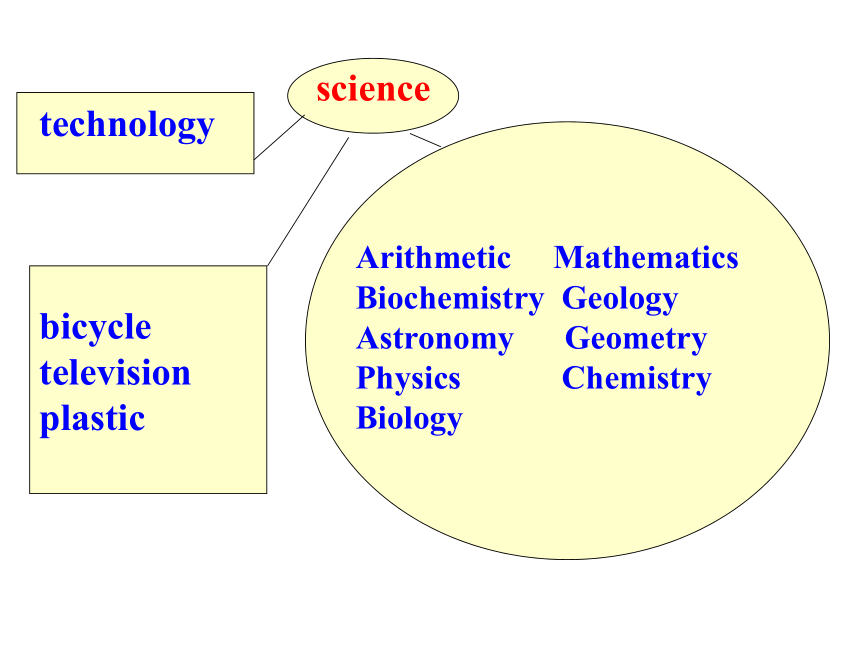
文档简介
(共19张PPT)
Word power
Greek in English
M9U2
Learning aims
By the end of this lesson, we will be able to:
1) understand and pronounce correctly some Greek words used in English, such as technology, antimatter, socialism, gymnasium, philosophy etc.
2) understand and master some Greek prefixes: anti-, auto-, bio-, kilo-, micro-, and tele-.
3) understand and master some Greek suffixes: -ism, -ist, -ize, -phone and -scope.
4) understand and translate the five well-known Greek proverbs into Chinese.
the Angles and the Saxons
the Norwegians
the French
the Germans
ill
sick
beef, mutton,
pork, bacon
man/men,
child/children
Borrowed words which language did the word(s) came from?
Questions:
1) What kind of words are the vast majority of Greek words used about in English?
2) What also contributes to the Greeks?
(English words about science and technology)
(sport, theatre and music)
borrowed words
from Greek
science
prefixes
sport
others
suffixes
theatre and music
science
technology
bicycle
television
plastic
Arithmetic Mathematics Biochemistry Geology Astronomy Geometry
Physics Chemistry
Biology
prefix
meaning
example
more
examples
anti--
auto--
bio--
kilo--
micro--
tele--
opposite-
antimatter-
self-
automatic-
?-
?-
?-
?-
?-
?-
life-
biology-
1000-
kilometre-
small-
microwave-
far;far off-
television
suffix
meaning
example
more
examples
-ism-
-ist-
-ize-
-phone-
-scope-
-
idea
socialism-
people-
socialist-
?-
?-
?-
?-
?-
-
To make verbs
socialize-
sound
telephone-
looking at -
microscope-
sport
gymnasium
athlete
stadium
marathon
theatre and music
theatre tragedy comedy music
orchestra chorus choir
pyramid mechanic museum ocean mystery photo
democracy
others
Philosophy Geography
Economics Theology
Politics History
Arts and Humanities
Science
Academic subjects
Fill in the blanks in Part C on page 23
Practice
Answers:
(1) theatre (2) music
(3) choir/chorus (4) History
(5) museums (6) Geography
(7) Science (8) technology
Word guessing
Can you guess the meaning of the following words according to what we have learned so far?
triangle telescope biotechnology automobile socialist kilometer terrorist
gymnast marathon microwave specialize tragedy communism
Beauty of the mind is superior to that of the body.—Aesop
What is beautiful is good, and who is good will soon be beautiful. —Sappho
Better to be envied than pitied.—Thales
心灵美胜于身材美。— 伊索
有道德的人更美。—莎孚
被人羡慕胜于遭人怜悯。—泰利斯
No man is free who cannot master himself.—Pythagoras
Keep a healthy mind in a healthy body.—Socrates
不能控制自己的人不自由。
—毕达哥拉斯
将健康的心灵保持在健康的躯体中。
—苏格拉底
Homework
Revise the words we have learned in Part A and Part B.
Have a discussion about the proverb you like best in pairs. Then tell your partner the reasons and write them down in your notebook.
Good-bye!
Word power
Greek in English
M9U2
Learning aims
By the end of this lesson, we will be able to:
1) understand and pronounce correctly some Greek words used in English, such as technology, antimatter, socialism, gymnasium, philosophy etc.
2) understand and master some Greek prefixes: anti-, auto-, bio-, kilo-, micro-, and tele-.
3) understand and master some Greek suffixes: -ism, -ist, -ize, -phone and -scope.
4) understand and translate the five well-known Greek proverbs into Chinese.
the Angles and the Saxons
the Norwegians
the French
the Germans
ill
sick
beef, mutton,
pork, bacon
man/men,
child/children
Borrowed words which language did the word(s) came from?
Questions:
1) What kind of words are the vast majority of Greek words used about in English?
2) What also contributes to the Greeks?
(English words about science and technology)
(sport, theatre and music)
borrowed words
from Greek
science
prefixes
sport
others
suffixes
theatre and music
science
technology
bicycle
television
plastic
Arithmetic Mathematics Biochemistry Geology Astronomy Geometry
Physics Chemistry
Biology
prefix
meaning
example
more
examples
anti--
auto--
bio--
kilo--
micro--
tele--
opposite-
antimatter-
self-
automatic-
?-
?-
?-
?-
?-
?-
life-
biology-
1000-
kilometre-
small-
microwave-
far;far off-
television
suffix
meaning
example
more
examples
-ism-
-ist-
-ize-
-phone-
-scope-
-
idea
socialism-
people-
socialist-
?-
?-
?-
?-
?-
-
To make verbs
socialize-
sound
telephone-
looking at -
microscope-
sport
gymnasium
athlete
stadium
marathon
theatre and music
theatre tragedy comedy music
orchestra chorus choir
pyramid mechanic museum ocean mystery photo
democracy
others
Philosophy Geography
Economics Theology
Politics History
Arts and Humanities
Science
Academic subjects
Fill in the blanks in Part C on page 23
Practice
Answers:
(1) theatre (2) music
(3) choir/chorus (4) History
(5) museums (6) Geography
(7) Science (8) technology
Word guessing
Can you guess the meaning of the following words according to what we have learned so far?
triangle telescope biotechnology automobile socialist kilometer terrorist
gymnast marathon microwave specialize tragedy communism
Beauty of the mind is superior to that of the body.—Aesop
What is beautiful is good, and who is good will soon be beautiful. —Sappho
Better to be envied than pitied.—Thales
心灵美胜于身材美。— 伊索
有道德的人更美。—莎孚
被人羡慕胜于遭人怜悯。—泰利斯
No man is free who cannot master himself.—Pythagoras
Keep a healthy mind in a healthy body.—Socrates
不能控制自己的人不自由。
—毕达哥拉斯
将健康的心灵保持在健康的躯体中。
—苏格拉底
Homework
Revise the words we have learned in Part A and Part B.
Have a discussion about the proverb you like best in pairs. Then tell your partner the reasons and write them down in your notebook.
Good-bye!
同课章节目录
- 模块9
- Unit 1 Other countries, other cultures
- Unit 2 Witnessing time
- Unit 3 The meaning of colou
- Unit 4 Behind beliefs
- 模块10
- unit 1 building the future
- unit 2 people on the move
- unit 3 protecting ourselves
- unit 4 law and orde
- 模块11
- unit 1 careers and skills
- unit 2 getting a job
- unit 3 the secret of success
- unit 4 the next step
